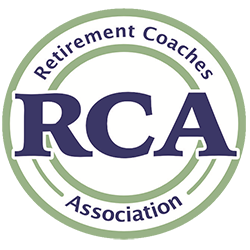
The Retirement Project is a conglomerate of companies focused on innovating and modernizing retirement services.


Certified Professional Retirement Coach
The CPRC is the only designation focused on the psychology and non-financial aspects of retirement planning. It provides the most comprehensive and innovative course work, coupled with the latest social science and proven methods for helping people make better retirement decisions and transitions. Our program not only educates members on the new retirement narrative, but also develops new skills and framework to meet growing clients needs… and is conveniently approved for CE credits with the CFP, SHRM, and ICF. Join our growing community and pioneering efforts with the first module for Free.
Visit Site

Retirement Coaches Association
The RCA is the only international organization for professionals that focuses on mid-life transitions related to retirement. We are made up of a dynamic and diverse group of people with varying professional credentials and experiences who share a common goal- Modernizing the World of Retirement. We host the Retirement Coaching industry’s premiere conference and attract the industry’s top influencers. As an organization, we have written 4 best-selling books, have members speak at conferences around the globe, and offer forward thinking ideas and services through a variety of podcasts, syndicated columns, video courses and more.
Visit Site

Retirement Intelligence
The RQ Assessment is the new, more comprehensive measure of personal retirement readiness and the “X” factor that has been missing from traditional planning. It’s an online, 56 question tool that produces a 15-page report, including an “RQ score.” Thoughtfully designed questions around personality, preference, behaviors, and expectations help identify personal strengths and areas of opportunity across a variety of factors known to closely affect the retirement transition. Rooted in a decade of research, discussion, and interviews, we have learned that making the best possible transition requires a high level of Retirement Intelligence or RQ.
Visit Site

Retirement Ministries
Our ministry focuses on using the concepts of retirement and legacy to bring people closer to Christ. Through insightful Bible studies, video series, speaking engagements, and books our goal is to make sure people understand that retirement isn’t life’s ultimate goal! Getting in to heaven is! Research suggests that a number of older adults believe in God and have attended church in the past, but have drifted away due to old and outdated perceptions of it. They haven’t experienced a personal relationship with Jesus Christ and we want to change that by bringing Biblical ideas, characters, and truths into the modern fold of retirement and legacy planning.
Visit Site

Robert Laura.com
Keynote speaker, trainer, and consultant Robert Laura is a pioneer in the psychology and social science of retirement and legacy planning. He is a five-time best-selling author, nationally syndicated columnist, and recognized presenter at conferences across the country. His work has reached millions of retirement readers and listeners through a variety of books, podcasts, guides, and 900 retirement-related articles. In addition to his own writings, he frequently appears in major business media outlets such as the Wall Street Journal, USA Today, CNBC, MarketWatch, the New York Times, and more.
Visit Site